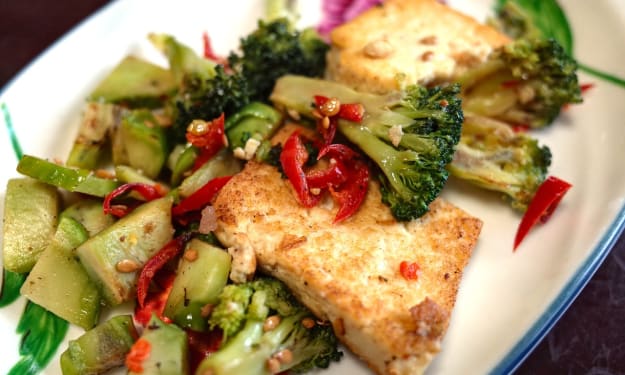Vegans, Watch Your Vitamin B12 Intake
Contrary to common omnivore belief, vegans aren't more likely to have nutritional deficits—except for vitamin B12.

Vegans usually don't have to worry too much about where their nutrition is coming from. Those who follow a whole food, plant-based diet tend to naturally reach recommended values for protein, iron, vitamin D, and many other macro and micronutrients non-vegans love to harp on.
However, they are right on one thing: Vegans need to actively know where they're getting their vitamin B12.
What is vitamin B12?
Vitamin B12 is important because of its role with blood formation and cell division. A lack of it can cause severe nerve damage and anemia—and prolonged deficiency can turn into paralysis. Vitamin B12 deficiency is no joke.
Unfortunately, vegans and vegetarians are at a higher risk for B12 deficiency, as many animal products do contain vitamin B12. However, B12 is actually produced by bacteria—the animals absorb the vitamin by rolling around in dirt and eating less clean things. Many plant foods used to contain vitamin B12, but as agriculture continues to become more hygienic and utilizes hydroponic systems (where no soil is used), it has disappeared from many vegetables and fruits.
However, it gets worse: While vegans and vegetarians are at higher risk for B12 deficiency, you can't look for the warning signs of lethargy, foggy brain, etc. This is because vegans and vegetarians intake large quantities of folic acid, which masks early symptoms.
So, checkmate vegans?
So, meat-eaters won the diet debate? Think again.
Remember, vitamin B12 isn't unique to animals or plants, so you don't actually need to get it from animal products.
Reliable sources of vitamin B12 include supplements and fortified foods. The foods most commonly fortified include nutritional yeast, cold cereal, and plant milk.
Nutritional yeast tends to be a popular way to supplement just because of its naturally funky, tangy, "cheesy" flavor. It's a staple in any vegan household that enjoys mac and cheese, and can be used to top your salads, tacos, or even on top of steamed veggies for added flavor.
You can probably get your full dose of B12 during breakfast with some cereal and milk. However, make sure that each product is actually fortified. For instance, Silk fortifies their soy milk with B12, but leaves that crucial vitamin out of their cashew or almond milks. If you rely on fortified foods instead of a guaranteed vitamin supplement, you need to make sure to check the nutritional label for B12.
Some Natural Sources of B12
There are a few natural vegan foods that contain a little vitamin B12, but whether or not they really "count" is debated. This is because these forms of B12 contain corrinoids that are "inactive analogues," which means that our enzymes can't properly process these forms of B12. Keep in mind that, despite there being some claims that plant foods naturally contain vitamin B12, fortified foods and vitamin supplements remain the safest and most reliable sources for vegans.
Mushrooms
Not just any mushrooms though—white buttons and portobello mushrooms contain negligible amounts of B12. Specifically, dried shiitake mushrooms contain the highest amount of vitamin B12 per gram, at 5.6 micrograms per 100 grams.
Since the FDA recommends 2.4 micrograms a day for the average American, you could technically eat 50 grams of these. That being said, at the price and amount needed, it's highly unlikely that you could or should consume 50 grams of shiitake mushrooms daily.
Edible Algae
Dried and pressed algae—commonly known as "nori" (the seaweed square you roll your sushi in)—is one of the better sources of B12. The green and purple laver varieties contain up to 63.6 and 32.3 micrograms per 100 grams. So, enjoy a nice cucumber roll, or mix and match veggies to make the perfect sushi burrito, and you may be reaching your recommended value for vitamin B12.
Tempeh
Some fermented foods contain some traces of B12, which makes sense, since the driving force of fermentation is bacterial growth. (The good kind, with positive words like "probiotic" and "gut health" associated.) Tempeh, which is created with fermented soybeans, does contain a bit of B12.
That being said, tempeh only has somewhere between 0.7 to 0.8 micrograms per 100 gram serving. So, it could probably supplement your fortified foods, but don't expect it fulfill your recommended daily values.
Know where your vitamin B12 comes from.
Whether you take a vitamin supplement or are covering your meals with a healthy layering of fortified nutritional yeast, make sure that you are actively making sure to get enough vitamin B12. Unlike so many other nutrients, this is one that you can't just intuitively consume.
Veganism can be an extremely rewarding diet and lifestyle, so don't let this deter you from making the best choice for yourself. This is about eating smarter and better, and knowing what you need and don't need to put in your body. Hopefully this advice informs you as a health and animal activist.
About the Creator
Haley Booker-Lauridson
Haley is a passionate freelance writer who enjoys exploring a multitude of topics, from culture to education.
Enjoyed the story? Support the Creator.
Subscribe for free to receive all their stories in your feed. You could also pledge your support or give them a one-off tip, letting them know you appreciate their work.






Comments
There are no comments for this story
Be the first to respond and start the conversation.